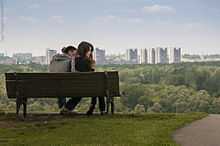Demographics of Belgrade
Belgrade is the capital and largest city of Serbia.

There are around 1.7 million people living in Belgrade.
Ethnic groups
Data taken from the 2002 census.[1]
| Ethnicity | Number | Percent |
| Serbs | 1,417,187 | 89.9% |
| Yugoslavs | 22,161 | 1.4% |
| Montenegrins | 21,190 | 1.3% |
| Romani | 19,191 | 1.2% |
| Croats | 10,381 | 0.7% |
| Macedonians | 8,372 | 0.5% |
| Muslims | 4,617 | 0.3% |
| Gorani | 3,340 | 0.2% |
| Slovaks | 2,199 | 0.1% |
| Slovenes | 2,084 | 0.1% |
| Magyars | 2,080 | 0.1% |
| Albanians | 1,492 | 0.1% |
| Romanians | 1,379 | 0.1% |
| Bulgarians | 1,272 | 0.1% |
| Bosniaks | 1,188 | 0.1% |
| Russians | 1,049 | 0.1% |
| Others | 6,175 | 0.5% |
| Regional identity | 586 | 0.3% |
| Undeclared | 29,312 | 1.6% |
| Unknown | 20,869 | 1.3% |
| TOTAL | 1,576,124 | 100% |
Religion
| Religion | Number | Percent |
| Eastern Orthodoxy | 1,429,170 | 90.7% |
| Atheism | 23,240 | 1.5% |
| Islam | 20,366 | 1.3% |
| Roman Catholicism | 16,305 | 1.0% |
| Protestantism | 3,796 | 0.2% |
| Asian (Judaism, Buddhism, Hinduism) | 4,102 | 0.3% |
| Undeclared | 47,349 | 3% |
| Unknown | 31,796 | 2% |
| TOTAL | 1,576,124 | 100% |
References
- ↑ City of Belgrade - Population. Beograd.rs. Accessed 3 September 2009.